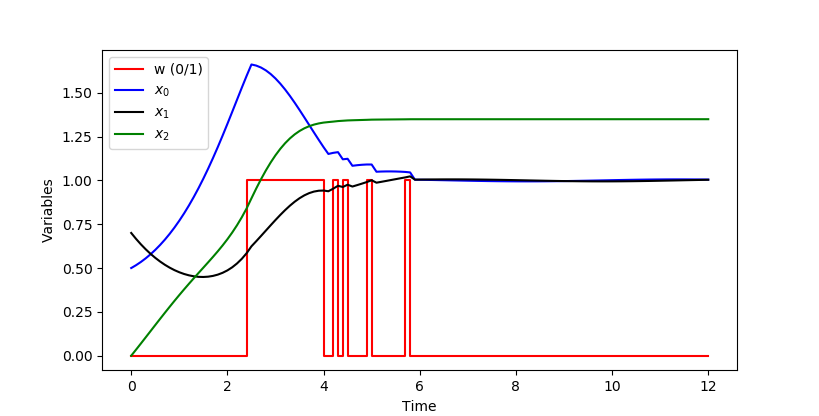Difference between revisions of "Lotka Volterra fishing problem (GEKKO)"
From mintOC
(Create results page with Python GEKKO) |
m |
||
| Line 56: | Line 56: | ||
</source> | </source> | ||
| − | An MINLP solution is calculated with [https://apopt.com APOPT] with an objective function value of <math>x_2(t_f) = 1. | + | An MINLP solution is calculated with [https://apopt.com APOPT] with an objective function value of <math>x_2(t_f) = 1.349497</math>. |
[[File:Volterra_fishing_GEKKO.png]] | [[File:Volterra_fishing_GEKKO.png]] | ||
[[Category:Gekko]] | [[Category:Gekko]] | ||
Latest revision as of 20:17, 13 March 2019
This page contains a solution of the MIOCP Lotka Volterra fishing problem in GEKKO Python format. The model in Python code for a fixed control discretization grid using orthogonal collocation and a simultaneous optimization method. The GEKKO package is available with pip install gekko.
import numpy as np import matplotlib.pyplot as plt from gekko import GEKKO m = GEKKO() # create GEKKO model # Add 0.01 as first step # 0,0.01,0.1,0.2,0.3,...11.9,12.0) m.time = np.insert(np.linspace(0,12,121),1,0.01) # change solver options m.solver_options = ['minlp_gap_tol 0.001',\ 'minlp_maximum_iterations 10000',\ 'minlp_max_iter_with_int_sol 100',\ 'minlp_branch_method 1',\ 'minlp_integer_tol 0.001',\ 'minlp_integer_leaves 0',\ 'minlp_maximum_iterations 200'] c0 = 0.4 c1 = 0.2 last = m.Param(np.zeros(122)) last.value[-1] = 1 x0 = m.Var(value=0.5,lb=0) x1 = m.Var(value=0.7,lb=0) x2 = m.Var(value=0.0,lb=0) w = m.MV(value=0,lb=0,ub=1,integer=True) w.STATUS = 1 m.Obj(last*x2) m.Equations([x0.dt() == x0 - x0*x1 - c0*x0*w,\ x1.dt() == - x1 + x0*x1 - c1*x1*w,\ x2.dt() == (x0-1)**2 + (x1-1)**2]) m.options.IMODE = 6 m.options.NODES = 3 m.options.SOLVER = 1 m.options.MV_TYPE = 0 m.solve() plt.figure(1) plt.step(m.time,w.value,'r-',label='w (0/1)') plt.plot(m.time,x0.value,'b-',label=r'$x_0$') plt.plot(m.time,x1.value,'k-',label=r'$x_1$') plt.plot(m.time,x2.value,'g-',label=r'$x_2$') plt.xlabel('Time') plt.ylabel('Variables') plt.legend(loc='best') plt.show()
An MINLP solution is calculated with APOPT with an objective function value of  .
.
